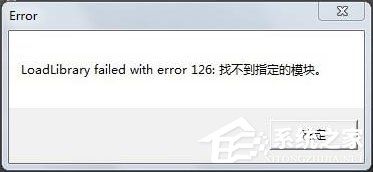装载dll文件提示“LoadLibrary失败”怎么解决?一用户在开发程序时写了一个dll文件,但是在调用dll文件时出错了,提示“LoadLibrary failed with error126:找不到指定的模块。”,这是怎么回事呢?下面给大家分析出现LoadLibrary失败的原因及解决办法。

一、出现LoadLibrary失败的原因
通常LoadLibrary失败的原因大多是代码书写不规范,编写dll文件一般不是很难,但关键是在写dll的时候代码不规范,这样在调用时就有可可能出现这样那样的问题,出现LoadLibrary失败也就不足为怪了,为了保证你使用正确的调用规范,要通知编译器使用stdcall规范和/或使用在windows.h(及相关文件)中定义的常量,如WINAPI等。通常DLL的代码如下:
01WORD WINAPI vbShiftRight(WORD nValue, WORD nBits)
02{
03return (nValue >> nBits);
04}
复制代码 WORD WINAPI vbShiftRight(WORD nValue, WORD nBits) { return (nValue >> nBits); }
下一步是与你在微软文档中读到的内容相反。你需要创建一个DEF文件。这是你防止输出函数名不出现乱字符的唯一方式(如_vbShiftRight@1)。DEF文件的形式如下:
01EXPORTS
02vbShiftRight
复制代码 EXPORTS vbShiftRight
下一步是在VB中调用这个函数,使用以下声明:
01Declare Function vbShiftRight Lib "MYDLL.DLL" (ByVal nValue As Integer,
02ByVal nBits As Integer)
03As Integer
04Sub Test()
05Dim i As Integer
06i = vbShiftRight(4, 2)
07Debug.Assert i = 1
08End Sub
复制代码 Declare Function vbShiftRight Lib "MYDLL.DLL" (ByVal nValue As Integer, ByVal nBits As Integer) As Integer Sub Test() Dim i As Integer i = vbShiftRight(4, 2) Debug.Assert i = 1 End Sub
如果你还想要更容易的方法从VB中调用,可以创建一个类型库。为此你需要创建和编译ODL(对象描述语言)文件。这个文件应该包含如下内容:
01module MyModule {
02[
03helpstring("Shifts the bits of an integer to the right."),
04entry("vbShiftRight")
05]
06short _stdcall vbShiftRight([in] short nValue, [in] short nBits);
07};
复制代码 module MyModule { [ helpstring("Shifts the bits of an integer to the right."), entry("vbShiftRight") ] short _stdcall vbShiftRight([in] short nValue, [in] short nBits); };
当VB加载DLL的类型库时,函数名和参数将出现在VB的对象浏览器中。此外,如果用户不输入正确的参数类型,VB将有可能产生LoadLibrary失败错误。
还有就是你最好用正确的方法调用dll,以下是我正常调用dll的函数:
01typedef void __declspec(dllimport) StartQueryForm(TDispatchConnection*,TApplication*);
02StartQueryForm* query;
03char buf[256];
04if (!GetSystemDirectory(buf,256)) {
05Application->MessageBox("读取系统目录错误","错误",MB_OK+MB_ICONERROR);
06return ;
07}
08AnsiString sCmd=AnsiString(buf)+"\\QueryEnh.dll";
复制代码 typedef void __declspec(dllimport) StartQueryForm(TDispatchConnection*,TApplication*); StartQueryForm* query; char buf[256]; if (!GetSystemDirectory(buf,256)) { Application->MessageBox("读取系统目录错误","错误",MB_OK+MB_ICONERROR); return ; } AnsiString sCmd=AnsiString(buf)+"\\QueryEnh.dll";
01HINSTANCE Package = LoadLibrary(sCmd.c_str());
02if (Package)
03{
04try {
05query = (StartQueryForm *)GetProcAddress((HINSTANCE)Package, "_StartQueryForm");
06if (query) {
07TDispatchConnection* conn=(MainForm->ConnectionWay==1 ?
08(TDispatchConnection*)MainForm->dcomConnect:
09(TDispatchConnection*)MainForm->sockConnect);
10query(conn,Application);
11}
12else {
13AnsiString str="加载函数失败,失败原因:\n\r";
14str+=SysErrorMessage(GetLastError());
15Application->MessageBox(str.c_str(),"错误",MB_OK+MB_ICONERROR);
16}
17}
18__finally {
19FreeLibrary(Package);
20}
21}
22else
23{
24AnsiString str="加载库失败,失败原因:\n\r";
25str+=SysErrorMessage(GetLastError());
26Application->MessageBox(str.c_str(),"´íÎó",MB_OK+MB_ICONERROR);
复制代码 HINSTANCE Package = LoadLibrary(sCmd.c_str()); if (Package) { try { query = (StartQueryForm *)GetProcAddress((HINSTANCE)Package, "_StartQueryForm"); if (query) { TDispatchConnection* conn=(MainForm->ConnectionWay==1 ? (TDispatchConnection*)MainForm->dcomConnect: (TDispatchConnection*)MainForm->sockConnect); query(conn,Application); } else { AnsiString str="加载函数失败,失败原因:\n\r"; str+=SysErrorMessage(GetLastError()); Application->MessageBox(str.c_str(),"错误",MB_OK+MB_ICONERROR); } } __finally { FreeLibrary(Package); } } else { AnsiString str="加载库失败,失败原因:\n\r"; str+=SysErrorMessage(GetLastError()); Application->MessageBox(str.c_str(),"´íÎó",MB_OK+MB_ICONERROR);
二、出现LoadLibrary失败解决办法
方式一:采用LoadLibraryEx
若DLL不在调用方的同一目录下,可以用LoadLibrary(L“DLL绝对路径”)加载。但若调用的DLL内部又调用另外一个DLL,此时调用仍会失败。
解决办法是用LoadLibraryEx:
LoadLibraryEx("DLL绝对路径", NULL, LOAD_WITH_ALTERED_SEARCH_PATH);
通过指定LOAD_WITH_ALTERED_SEARCH_PATH,让系统DLL搜索顺序从DLL所在目录开始。
方式二:采用SetCurrentDir
跨目录调用dll,你应该这样
1、用GetCurrentDir保存当前的工作目录
2、用SetCurrentDir将当前的工作目录,设置为你的DLL所在的路径,需要使用绝对路径
3、用LoadLibrary你的DLL
4、使用SetCurrentDir恢复到原来的工作路径
以上便是装载dll文件提示“LoadLibrary失败”的原因及解决办法,有遇到此错误提示的伙伴,可以参考上文解决。